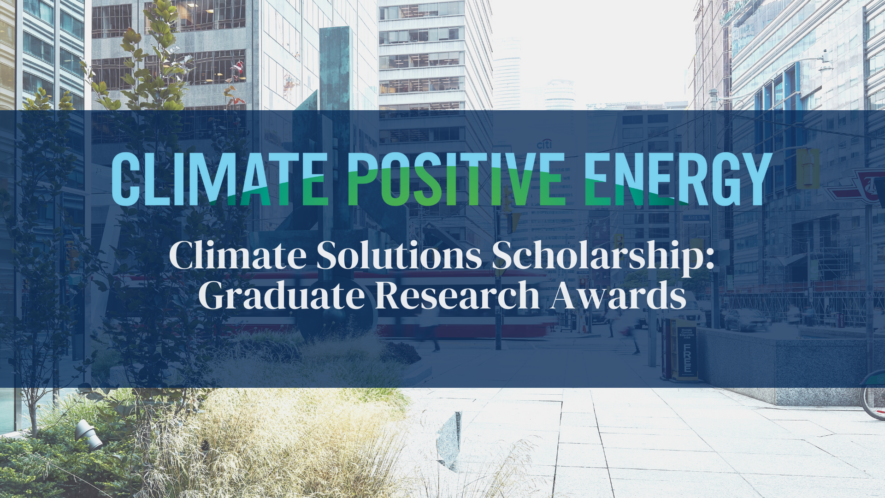
Climate Positive Energy is currently inviting applications for the research initiative’s Graduate Scholarship for multi-disciplinary doctoral and master’s degree students for the 2023-2024 academic year.
Post date: March 20, 2023
Closing date: April 10, 2023
Purpose
These scholarships are intended to fund world-class research in multi-disciplinary sustainable energy research and attract distinguished early career researchers to the University of Toronto. Climate Positive Energy aims to support research developing social, scientific, technical, economic and policy solutions that support that support Canada and the world in achieving an equitable energy transition toward net zero 2050 goals.
Award
Graduate Students will be supported with a minimum of $15,000 each. Recipients will be part of a growing network of Climate Positive Energy graduate students and post-doctoral fellows with dedicated programming and career and professional development activities.
Research Themes
Climate Positive Energy invites research related to one of the following themes:
- Just Transitions
Research in this theme focuses on investigating best pathways to climate positive energy systems and ensuring equitable access to clean energy. This may include but not limited to mitigating consequences of clean energy production, and understanding how social, environmental, and indigenous justice can be put at the forefront of climate positive energy transitions, and investigating health and wellness co-benefits of sustainable infrastructure.
- Carbon
Research in this theme focuses on decarbonizing energy systems, with focus on the toughest emissions. This may include but not limited to expanding renewable energy, improving energy efficiency, and reducing energy demands. Research under this theme may involve developing improved energy storage and energy generation systems, electrification, efficiency, investigating infrastructure-embodied carbon and building solutions, and designing smart and resilient energy grids, and carbon capture and sequestration technologies.
- Measurements, Modelling and Markets
Research in this theme aims to understand the impacts of technology and policy, create powerful models, and understand market-based pathways. This broad theme may include climate scenario modelling, emissions measurement strategies, investigating the effectiveness of ESG policies, and understanding the implications of potential energy projects and policies.
Application Procedure
Please apply via the online portal here.
The application should consist of PDF files containing the following required components. All components should be submitted by 11:59pm (EST) on April 10, 2023. Please direct any questions to info@cpe.utoronto.ca
1. Research proposal [500 words max, 1 figure, 5 references max]
Describe the proposed research and how it is relevant to the Climate Positive Energy goals. The proposal should include the following sections: background, research objectives and work plan. Identify which area(s) the research impacts: the university, city, or country/world. Identify how the work will integrate multidisciplinary perspectives.
2. Curriculum Vitae & Transcripts
Please provide your academic CV and graduate-level university transcripts, unofficial transcripts are acceptable.
3. Letter of Recommendation
Please provide a letter of recommendation from your immediate supervisor.
Criteria for Selection
Applications will be evaluated on these criteria:
- Relevance of the research to Climate Positive Energy research themes and mission
- Quality of the proposed research, i.e., level of innovation, feasibility, and significance.
- Applicant qualifications, cover letter and academic excellence.
The University of Toronto and Climate Positive Energy are strongly committed to diversity within our community, and we welcome and encourage applications from racialized persons / persons of colour, women, Indigenous / Aboriginal People of North America, persons with disabilities, LGBTQ2S+ persons, and others who may contribute to the further diversification of ideas.